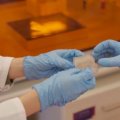Ipswich residents who suffer whiplash now have access to online advice through a new website launched by The University of Queensland’s Whiplash Research Unit.
The website, at www.som.uq.edu.au/whiplash, is an online information centre for sufferers of whiplash, offering a wealth of advice and evidence based information about whiplash, including some common symptoms, treatment strategies and latest research.
Whiplash is a common term used to describe the kinds of injuries suffered after a motor vehicle accident. Neck pain and headaches are the most common complaints, though symptoms such as dizziness, sleeping problems and difficulty with concentration are also reported.
While most people recover within a few weeks, some continue to have problems.
The website follows the recent expansion of UQ’s Whiplash Research Unit to the new research centre at the University’s Ipswich Campus.
The Ipswich Campus Whiplash Research Centre has been working closely with sufferers of whiplash in the Ipswich area, as part of its new study into the ‘big picture’ of whiplash and its impact.
As part of this study, Ipswich residents can participate in cutting-edge research into whiplash, focusing on the factors which determine how whiplash influences the emotional and physical well-being of sufferers.
Chief investigator Dr Michele Sterling encouraged residents who experience whiplash to become involved in the study, which aimed to track volunteers over time to monitor their recovery, beginning soon after their motor vehicle accident.
“The study incorporates some clinical tests performed at the research centre on campus, with innovative monitoring techniques that take the research ‘out of the lab’ and into everyday life,” she said.
“Our research confirms that in some cases, people who suffer neck pain from a motor vehicle accident can go on to experience pain and suffering months and even years after the injury.
“We’re only just beginning to learn what factors determine whether pain and suffering persist, but without knowing more it is difficult to intervene early to prevent long-term problems.”
The Ipswich research tracks individuals who suffer neck pain from soon after their accident (within five weeks) to one year after their accident. Participants receive an abridged battery of tests used in the whiplash clinic, at no cost. Participants are then asked to record information about the pain and suffering they experience in their daily lives as a result of the whiplash.
“The aim of the research is to determine factors that lead to people experiencing pain and suffering that interferes with their daily life over the long term,” Dr Sterling said.
Participation in the Ipswich study is voluntary and free-of-charge.
To participate, volunteers must be:
• aged between 18 and 65
• experience a motor vehicle accident within five weeks of registration
• suffer neck pain as a result of the accident
The Ipswich Centre is part of a National Health and Medical Research Council funded research centre, in conjunction with the Centre for National Research on Disability and Rehabilitation Medicine.
For the past 10 years, the Centre has been conducting research into the factors which assist in the recovery from neck pain after a motor vehicle accident.
Volunteers can contact Andrew Popple on 3365 5383 or email a.popple@uq.edu.au. Travel expenses will be reimbursed.
MEDIA: contact Andrew Popple on 3365 5383.
.jpg)



